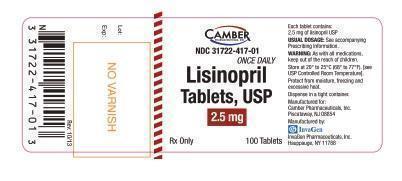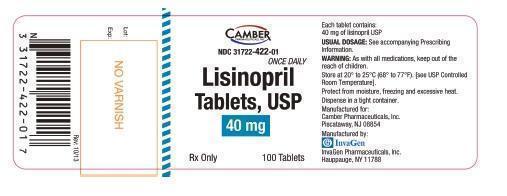Modern medicine has evolved so much so that sooner or later every breastfeeding mother needs to take it in one form or other. Medication that is present in mothers blood will transfer into her breast milk to some extent. Most drugs do so at low levels and pose no real risk to infants but then there are some exceptions. In This post will discuss whether Lisinopril | Camber Pharmaceuticals Inc. is safe in breast-feeding or not.
What is Lisinopril | Camber Pharmaceuticals Inc. used for?
Lisinopril is an angiotensin converting enzyme (ACE) inhibitor indicated for: Treatment of hypertension in adults and pediatric patients 6 years of age and older (1.1) Adjunct therapy for heart failure (1.2) Treatment of Acute Myocardial Infarction (1.3) 1.1 Hypertension Lisinopril tablets are indicated for the treatment of hypertension in adult patients and pediatric patients 6 years of age and older to lower blood pressure. Lowering blood pressure lowers the risk of fatal and non-fatal cardiovascular events, primarily strokes and myocardial infarctions. These benefits have been seen in controlled trials of antihypertensive drugs from a wide variety of pharmacologic classes. Control of high blood pressure should be part of comprehensive cardiovascular risk management, including, as appropriate, lipid control, diabetes management, antithrombotic therapy, smoking cessation, exercise, and limited sodium intake. Many patients will require more than 1 drug to achieve blood pressure goals. For specific advice on goals and management, see published guidelines, such as those of the National High Blood Pressure Education Program’s Joint National Committee on Prevention, Detection, Evaluation, and Treatment of High Blood Pressure (JNC). Numerous antihypertensive drugs, from a variety of pharmacologic classes and with different mechanisms of action, have been shown in randomized controlled trials to reduce cardiovascular morbidity and mortality, and it can be concluded that it is blood pressure reduction, and not some other pharmacologic property of the drugs, that is largely responsible for those benefits. The largest and most consistent cardiovascular outcome benefit has been a reduction in the risk of stroke, but reductions in myocardial infarction and cardiovascular mortality also have been seen regularly. Elevated systolic or diastolic pressure causes increased cardiovascular risk, and the absolute risk increase per mmHg is greater at higher blood pressures, so that even modest reductions of severe hypertension can provide substantial benefit. Relative risk reduction from blood pressure reduction is similar across populations with varying absolute risk, so the absolute benefit is greater in patients who are at higher risk independent of their hypertension (for example, patients with diabetes or hyperlipidemia), and such patients would be expected to benefit from more aggressive treatment to a lower blood pressure goal. Some antihypertensive drugs have smaller blood pressure effects (as monotherapy) in black patients, and many antihypertensive drugs have additional approved indications and effects (e.g., on angina, heart failure, or diabetic kidney disease). These considerations may guide selection of therapy. Lisinopril may be administered alone or with other antihypertensive agents [see Clinical Studies (14.1) ]. 1.2 Heart Failure Lisinopril tablets are indicated to reduce signs and symptoms of systolic heart failure [ see Clinical Studies (14.2)]. 1.3 Reduction of Mortality in Acute Myocardial Infarction Lisinopril tablets are indicated for the reduction of mortality in treatment of hemodynamically stable patients within 24 hours of acute myocardial infarction. Patients should receive, as appropriate, the standard recommended treatments such as thrombolytics, aspirin and beta-blockers [ see Clinical Studies (14.3)].
What are the risk associated with Lisinopril | Camber Pharmaceuticals Inc. usage while breastfeeding? What precautions shall I take while using it in breastfeeding?
Lisinopril is the one and only active ingredient present in Lisinopril | Camber Pharmaceuticals Inc.. Lisinopril in itself is a low risk drug for lactation so it is easy to understand that Lisinopril | Camber Pharmaceuticals Inc. also comes in category of Low Risk item while breastfeeding. Below is the summary of Lisinopril in breastfeeding.
Lisinopril | Camber Pharmaceuticals Inc. Breastfeeding Analsys
Low RiskCAS Number: 76547-98-3
Higher caution on early neonatal period is required. Check-up for blood hypotension and muscular hypotonia.
Lisinopril | Camber Pharmaceuticals Inc. Breastfeeding Analsys - 2
CAS Number: 83915-83-7
Because no information is available on the use of lisinopril during breastfeeding, an alternate drug may be preferred, especially while nursing a newborn or preterm infant.

I am nursing mother and I have already used Lisinopril | Camber Pharmaceuticals Inc., what should I do?
During whole lactation period you shall first discuss with your doctor and then together you shall decide whether you shall take that drug or not however if you have already taken Lisinopril | Camber Pharmaceuticals Inc. then you shall inform your doctor, But you should not be worried too much as Lisinopril | Camber Pharmaceuticals Inc. comes in category of low risk drug.
I am nursing mother and my doctor has suggested me to use Lisinopril | Camber Pharmaceuticals Inc., is it safe?
Though Lisinopril | Camber Pharmaceuticals Inc. dose not comes in category of safe drugs rather it comes in category of low risk but if your doctor is aware that you are breastfeeding your baby and has still recommended it then its advantages must be outweighing the risks.
If I am using Lisinopril | Camber Pharmaceuticals Inc., will my baby need extra monitoring?
Not much
Who can I talk to if I have questions about usage of Lisinopril | Camber Pharmaceuticals Inc. in breastfeeding?
US
National Womens Health and Breastfeeding Helpline: 800-994-9662 (TDD 888-220-5446) 9 a.m. and 6 p.m. ET, Monday through Friday
UK
National Breastfeeding Helpline: 0300-100-0212 9.30am to 9.30pm, daily
Association of Breastfeeding Mothers: 0300-330-5453
La Leche League: 0345-120-2918
The Breastfeeding Network supporter line in Bengali and Sylheti: 0300-456-2421
National Childbirth Trust (NCT): 0300-330-0700
Australia
National Breastfeeding Helpline: 1800-686-268 24 hours a day, 7 days a week
Canada
Telehealth Ontario for breastfeeding: 1-866-797-0000 24 hours a day, 7 days a week
Drug Brands with same Active ingredients



